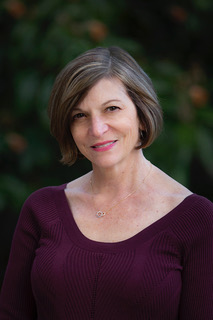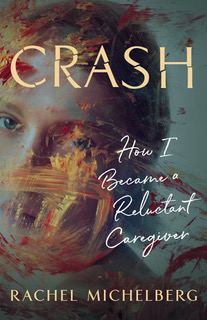
“I’m Not a Natural Caretaker.”
“I’m not a natural caretaker,” Rachel Michelberg admits in the opening pages of Crash: How I Became a Reluctant Caregiver [She Writes Press, April 2021], a memoir about the aftermath of a 2005 flight accident that left her husband of ten years with severe physical and mental impairments.
Her life upended, the mother of two made a decision that rattled her family and community: After multiple surgeries and extensive rehab had done everything possible, Michelberg decided not to bring her spouse home, but instead placed him in a skilled nursing facility where his 24/7 care could be assured.

Michelberg’s first book, “Crash: How I Became a Reluctant Caregiver” [She Writes Press, April 2021]
Predictably, the backlash was swift, and in her book, Michelberg details the denunciations flung at her, among them that “Jews should not be locked up through no fault of their own,” especially if they are defenseless. Likening her to a near-Nazi, husband David’s family and friends further assailed her as selfish and self-centered. She writes that her own needs discounted as frivolous.
But Michelberg’s book is her testimony. She says that she was simply doing what she needed to do to ensure her own survival as a woman, as a mother of young children, and as a theater professional and singer. Lilith’s Eleanor J. Bader interviewed the first-time author about the book, the writing process, and society’s continued assumptions about gender, caregiving. and female work.
Eleanor J. Bader: As I read Crash, I kept thinking about how hard it must have been to relive the accident and its aftermath. Why did you put yourself through this?
Rachel Michelberg: The focus of most memoirs about caregiving is that even though the caregiver was unprepared, thrust into a role they did not anticipate, they rose to the occasion and became better for it. I thought it was important to present another story, that it is possible to make a different decision and be at peace with yourself about it.
Women are still expected to fill the caretaker role. I had internalized that message too, but I want to tell those who are vacillating, who know in their hearts that caregiving is not something they want to do, that it’s okay not to do it.
I also want to put out a message about resilience. For me, it was important to recognize that I could take one step at a time, live five minutes or an hour at a time, and make it through the events that were unfolding. Finally, I want to stress that despite the fact that I knew that I could not oversee David’s daily existence, I wanted him to be treated with dignity and be as well-cared for as possible. I recognized my own limitations, knew that I was already doing all I could do for my family, tutoring Bar and Bat Mitzvah students, teaching singing, and caring for myself and my kids. I knew that having David at home would elevate my stress level, that I would resent him. This would not be good for anyone, David included.
Women are still expected to fill the caretaker role. I had internalized that message too, but I want to tell those who are vacillating, who know in their hearts that caregiving is not something they want to do, that it’s okay not to do it.
EJB: The memoir is honest about the fact that you were having an extramarital affair at the time of David’s accident and sought male companionship in its aftermath. This makes you fully human but it also made me wonder if you wavered about including this information. Are you worried about how your decisions will be received?
RM: Yes, I am, for several reasons. I’ve consulted a lawyer, in particular because Diane, the wife of the man I had an affair with before and immediately after David’s crash, repeatedly stalked, harassed, and menaced me. I got a restraining order against her and can get another one if I need to, but it is still unnerving to think about.
Additionally, I worry about pushback from the synagogue community, which rallied around us at the time of the accident. It’s been 15 years, but I am still concerned. Will people judge me negatively for my behavior? Will some of my current voice students or their parents want to stop associating with me? Still, I felt it important to present my needs in this context, since I did not suddenly become sexless after David became disabled.
EJB: Let’s switch topics and talk about writing. You were working full-time and raising elementary-school-aged kids when David had his accident. How did you fit in writing a memoir?
RM: Writing Crash actually took 11 years. I knew I had a story to tell but had no idea what I was doing when I began. I took a bunch of writing classes and, at first, I wrote scenes—the social worker giving me the option of bringing David home; different moments in the hospital; the turning in of David’s driver’s license when it became clear that he’d never drive again. My teachers helped me to bring in sensory details, and over time, I began to string the many scenes together.
At one point, I also attended a writing retreat which really discouraged me. The organizers brought in several publishing professionals who were incredibly negative about how hard it was to get something accepted. I left asking myself who I thought I was to believe I could write a book. Once I got home, I put what I’d written away and did not write another word for two years. But the story nagged at me.
I eventually hired an editor who worked with me before I submitted the manuscript to She Writes Press, because I wanted the book to be as polished as possible. I was lucky—I had the budget to do this.
EJB: Raising two kids and essentially becoming a single mother overnight must have been rough. Can you speak to the challenges of parenting Josh and Hannah?
RM: Josh didn’t ask a lot of questions, but Hannah did. At one point she asked me if David and I would still be married if he had not had the accident. I had to be truthful and told her, ‘No, probably not.’
I also had to explain David’s condition. After the accident, David became extremely impulsive and did not know how to parent anymore. He said things that were unkind, especially to Josh. I had to tell him that his daddy’s brain did not work right anymore, that he couldn’t help himself when he said mean things to him. I had to explain that his dad was not like other people, that he could not control what he said.
EJB: How heartbreaking. You describe a recurrence of anorexia nervosa during this time. That must have been horrible. Have you recovered?
RM: I tried to take care of myself as best I could, and went to writing classes and retreats. Friends and family would watch the kids but we lived in a small house—1500 square feet—and I constantly craved alone time.
I’d had an eating disorder in college and it began to crop back up when I started having feelings for Mark, before David’s accident. But the disorder really ramped up after David was hospitalized. Eating disorders are about control, and I did not have much at that time. I was hospitalized for it and while I no longer think about it every day, it is always lurking, waiting to come back.
EJB: You write about tensions between yourself and David’s family. Have these relationships improved over time?
RM: David’s sister Dora and his mother Maria were so dedicated, so sacrificing of their personal freedom, that I felt I could never measure up. David now lives in Israel, near Dora; she’s found a wonderful live-in caretaker for him. At this point, Dora and I have a minimal relationship. Pre-COVID, the kids visited David at least once a year and they’re eager to visit him again as soon as the pandemic is over.
EJB: Do you have any advice for the loved ones of someone who’s had a Traumatic Brain Injury?
RM: I encourage family members and friends to take care of themselves, to use their “village,” and join caregiver support groups. Take the respite care that is offered if you’re doing the caregiving yourself, and recognize the valuable work that is done by institutional caregivers, mostly women of color, if your loved one is in residential care.



